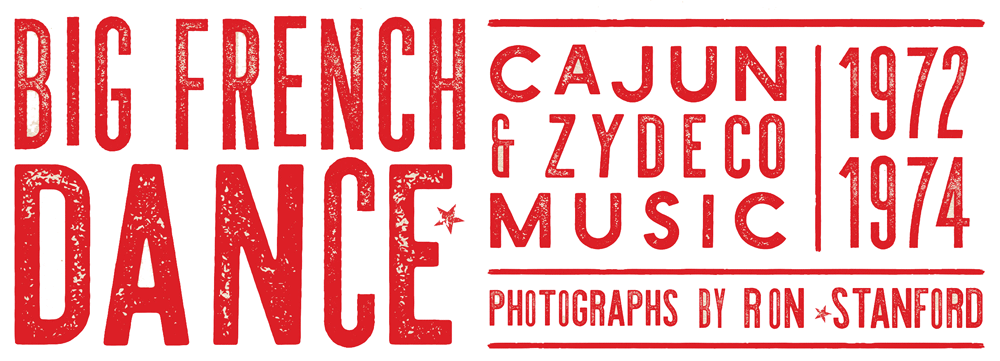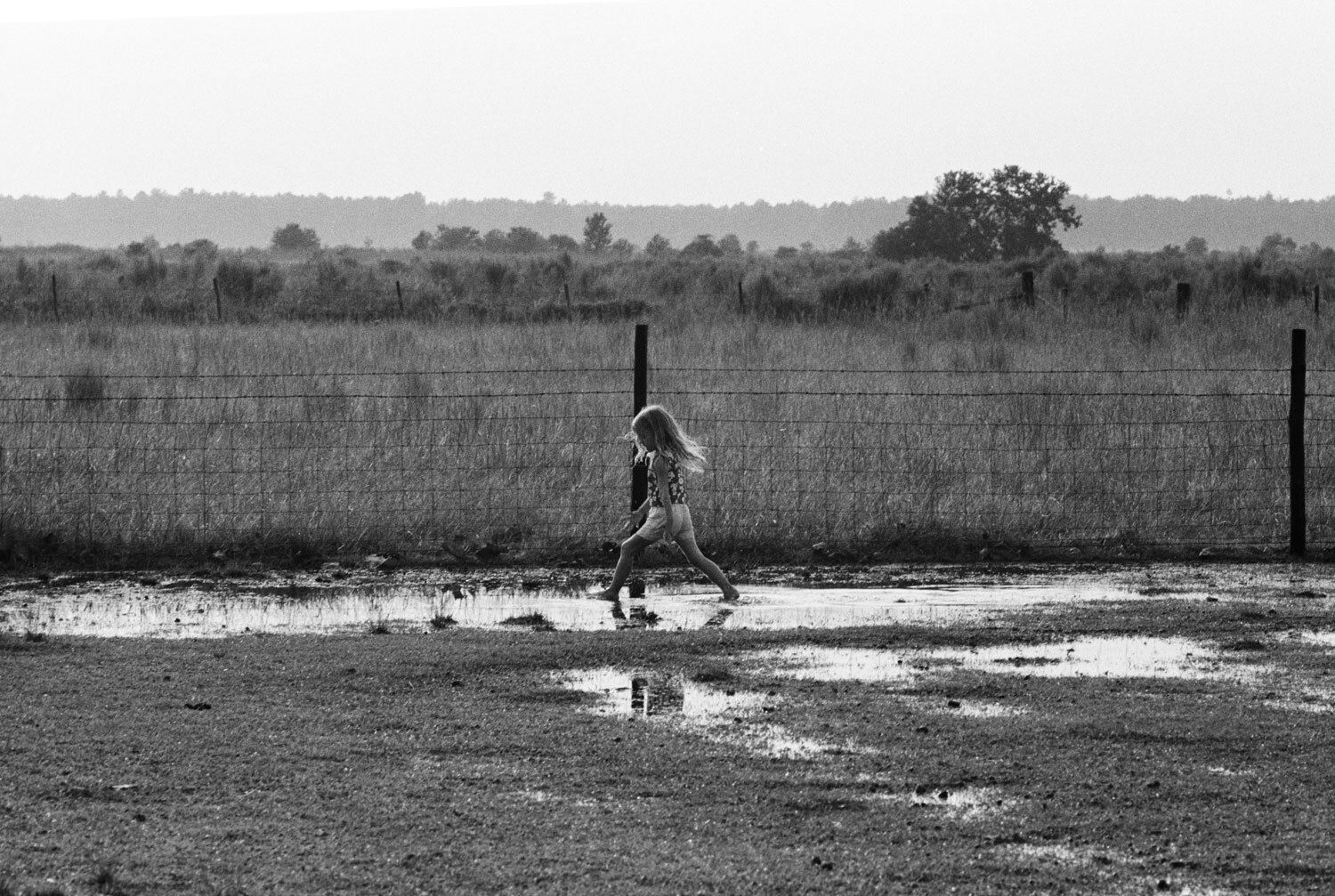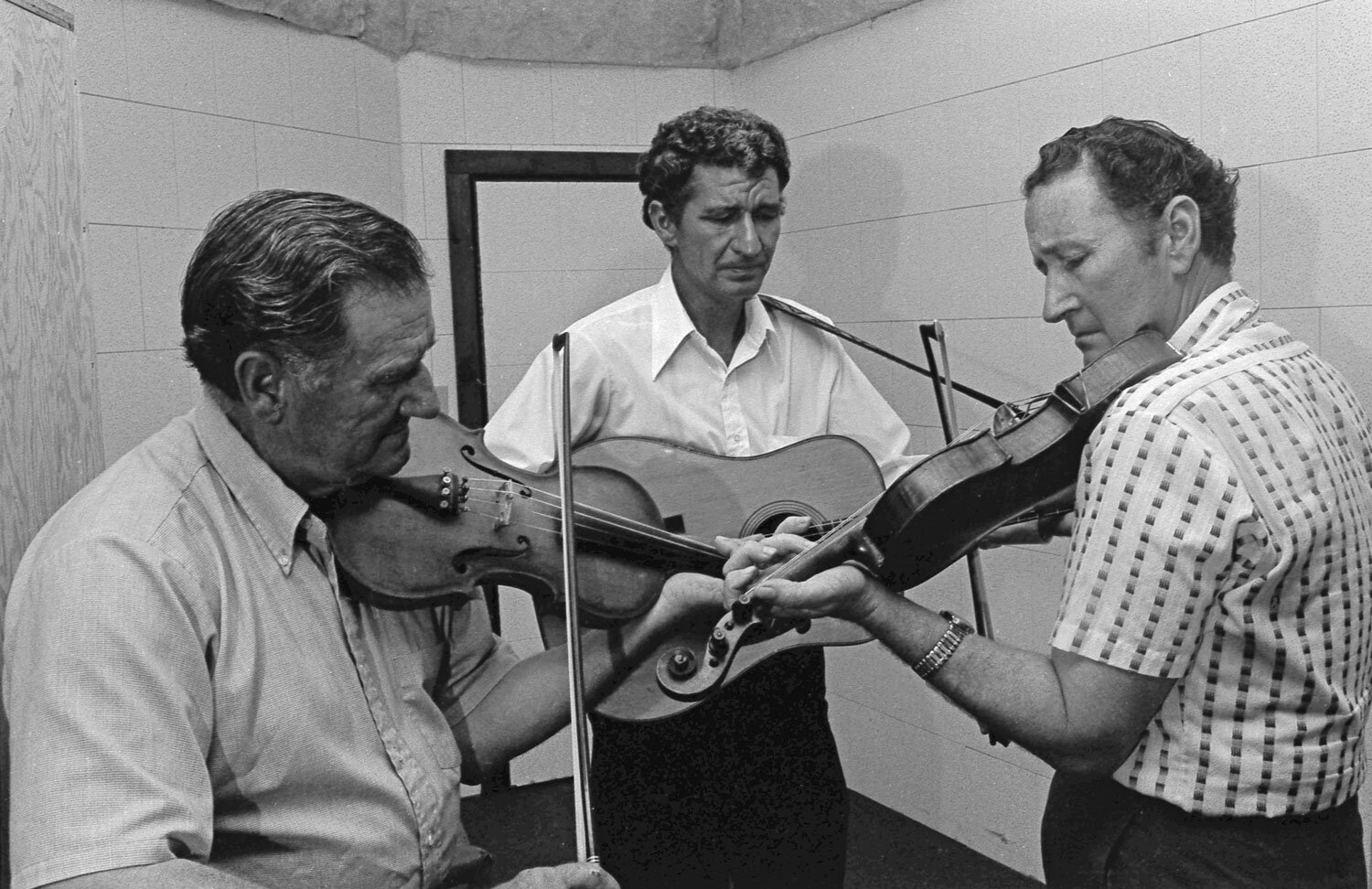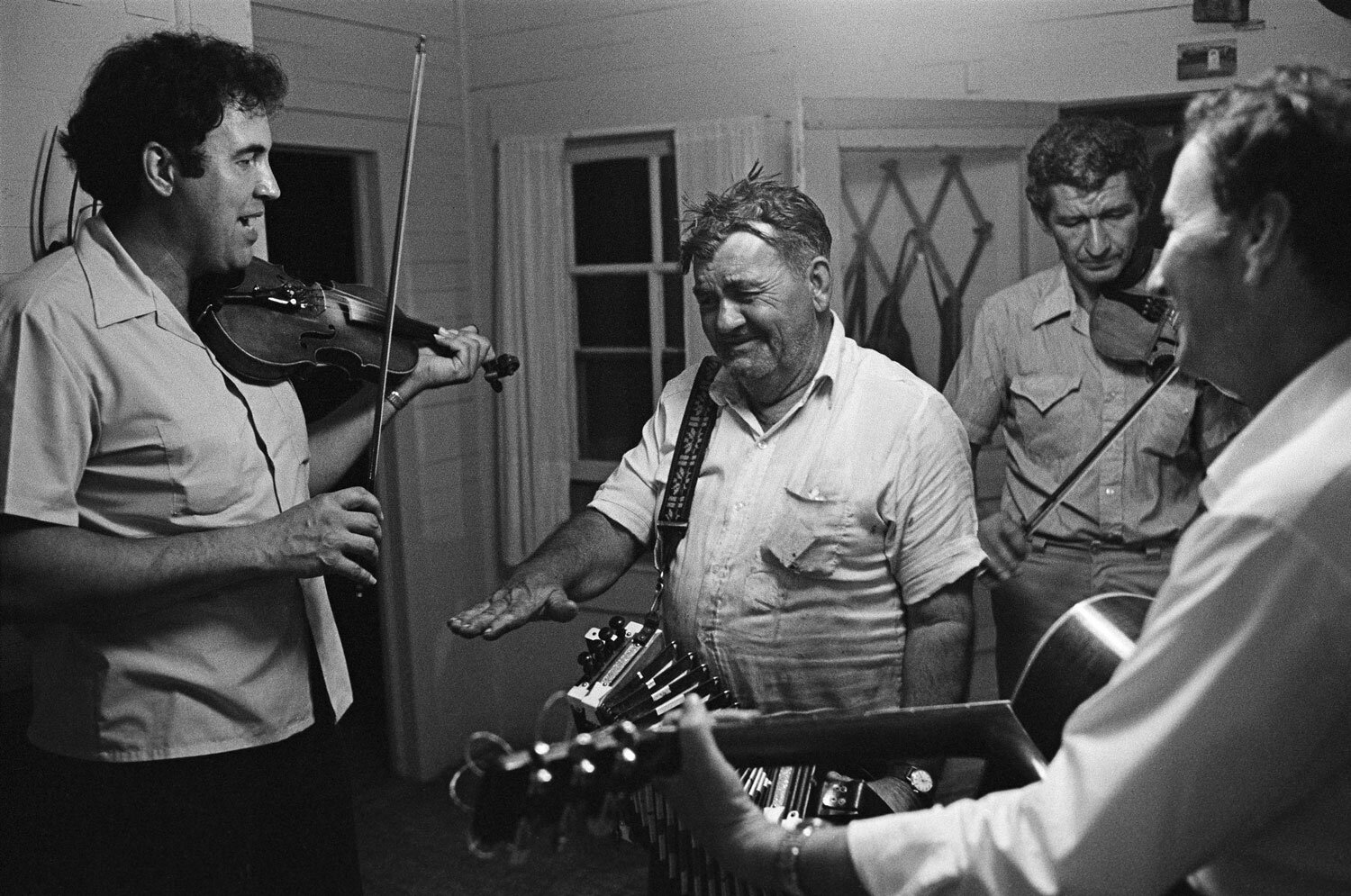Will Bolfa and his wife Euna Fontenot Bolfa labored all their lives to afford their new home. After his long day with the parish road crew was ended, Will was in the habit of spending the remaining daylight hours digging a well, adjusting plumbing, laying floors and painting walls. Frequently Tante (Aunt) Euna would stop on her way from Mamou to appraise the progress and finally to plant flower seeds in the thin bed along the brick front. At last the Bolfas, who spell their name as it is pronounced in French, settled into air-conditioned protection from the swelter of late spring.
Dewey and Hilda’s youngest, Christine, in her backyard in the countryside near Basile.
Some weeks later Euna's sister-in-law, Hilda, Dewey’s wife, arrived with me early in the morning to deliver a carrot cake for the housewarming which was to be held that afternoon. Tante Euna, her gray-blue hair piled up in stiff curls, was polishing her new kitchen table for the surprise party in her honor. We inspected four or five cakes, two of which Euna had baked herself in anticipation of her company. Over cups of strong coffee we gossiped, laughed and complained about our husbands, Euna and Hilda agreeing that there Is nothing to match the hard-headed feistiness of' a Balfa brother.
Will Bolfa, Rodney Balfa, Dewey Balfa
The Balfa Brothers, Will, Dewey and Rodney are three of nine children raised by sharecropping parents in the fields around Mamou, La. Their common inheritance includes curly hair, profoundly tragic eyes and a distinctive musical talent bequeathed them by a father who played four or five instruments himself, including fiddle, accordion and triangle.
In a smoky dance hall on a Saturday night, in an auditorium packed with enthusiastic and admiring college students, at barbecue in the woods behind Nonc Allie's general store, on an open air stage at a summer folk festival and in the hare-bulb glare of a pine boarded country home, The Balfa Brothers play and sing the songs they first heard from their father. The repertoire and instrumentation differ slightly depending upon the audience.
Lakeview Club, Eunice. click to enlarge. Spread from Big French Dance
At the Lakeview Dance Hall in Eunice, La., they play amplified instruments accompanied by Rodney's son Tony on drums, J. W Pelsia on steel guitar, and by young Ray Abshire on accordion. The tempo is usually altered to render the tunes more danceable. For northern audiences they substitute the traditional triangle for the sharp wallop of' the drums. Electric instruments are banished.
Rodney Balfa, Ray Abshire, and Dewey Balfa at the Lakeview Club, Eunice. Regular Satuday night gig. Ray recently passed away at 68 after a long career as a singer and accordion player. He made his living as the owner of an oil field service company, Magnolia Torque and Testing.
Wherever the Balfa Brothers perform, they preserve the emotional impact of Cajun music, and that is because they sing and play ultimately for themselves. Music is a natural function for Dewey and Rodney especially; like breathing and eating it is necessary for the sustenance of their souls. The exquisite torment of Rodney's voice, the eloquent complaint of Dewey's fiddle, the impassioned loneliness of their music lose nothing for the listener who doesn’t understand French. These songs are felt directly by the heart before they are perceived by the senses or mulled over by the intellect.
As children the Balfas were reared in pervasive poverty. Charles Balfa worked shares for many different landlords. A third to a half of the crop was promised to the landowner on condition that lumber would he provided for a fence around the yard, or on condition that within two years building materials could be procured so that the miserable hut which the family called home could he made livable. According to Dewey, a typical cabin provided by a landlord was so ramshackle that in rainy weather all the furniture had to he moved to the one spot under the roof which didn't leak. Somehow the bargain between sharecropper and landowner would dissolve, and disillusioned, Charles would move his family in a huff to a new tenant farm.
Rodney recalls when he was a small boy accompanying his father to see a landlord. Mr. Balfa was there to complain that after a workday in the fields, it was Will's responsibility to chop firewood for the boss before collecting firewood for his own family. The system was enforced in other ways as well because evidently the Balfa women were expected to feed the chickens and tend to the washing for the boss's family before they could worry about themselves.
Under these conditions education is a luxury, and after third grade Dewey was forced to abandon his studies so he could work in the fields. Rodney didn't get much farther, and Will never saw the inside of the schoolhouse.
According to all the brothers, laziness was not tolerated by their father. He worked himself like one of his mules, and he expected the same effort from his children. The reward for indolence was a stiff beating. When their father returned from a day of laboring in the cotton fields, he would frequently sing and play for his family.
Casses pas ma tête is an old waltz heard first by the brothers on such an occasion. Dewey composed some lyrics to the same tune, which he called The Grand Prairie Waltz when he had a girlfriend from that town. That romance having concluded long ago, the version on this recording is as he recalls it from childhood. J'Etais au Bal probably has roots in an English tune like Cindy or Oh, Susannah: The French version, of anonymous authorship, is of relatively recent vintage but has become part of Cajun musical tradition. It is performed here as it would be in the dance hall, complete with drums, steel guitar and accordion.
Left to right: Marc Savoy, Nathan Abshire, Rodney Balfa, Dewey Balfa
The accordionist Nathan Abshire played dances with the Balfa Brothers for many years and still occasionally performs with them nowadays. Brown as a sausage from his long hours in the Basile town dump, Mr. Nathan can he found weekdays seated on his heels before the smoking refuse heaps, pounding the saleable metal out of discarded radios. A few blocks away the front porch of his home is buried behind a bewildering clutter of car parts, bicycle tires and lawnmowers recovered from the dump which are slated for repair and resale.
Fifty-five years ago Nathan played his first dance and he has been playing regularly ever since. He performed in clubs six nights a week for years before he started working during the day. There is not a Cajun from Lafayette to Lake Charles who has not at some time heard him play at a dance, or an informal social function, listened to his recordings, or seen him on the early morning television broadcast known as Passe Partout. The lilt and chop of Nathan's unique accordion style is heavily influenced by black music. Undoubtedly, his most popular composition is a blues tune known variously as Pine Grove Blues or Ma Negresse.
Mr. Nathan at La Louisianne Studios, Lafayette
To be fully appreciated as a performer, Nathan must be seen as heard, for he is an accomplished showman endowed with the ability to enliven and animate his audiences. Clowning and dancing on stage, he sings to a crowd of dancers. "It's Saturday night and everybody’s having a good time!" Then he’ll hitch the pleated box over his belly, set the tempo, and the band moves into it. As this recording indicates, the Balfa Brothers are a remarkably versatile band. Not only are they transmitters of an endangered musical style, but they function also as interpreters of a more modern form.
In spite of' the pride felt by all thc musicians' wives at the Balfa Brothers’ popularity, these women feel some drawbacks to their husbands' musical careers. Ann, Rodney’s wife, complains about the long distances that must be traveled by musicians between home and the halls they play in. Neither club owners nor festival promoters pay lucrative salaries to performers. Euna has always considered dance halls a major threat to any and all stable marriages.
Hilda laments, "Honey, if I had a nickel for every time I heard Dewey say, ‘One more song!’ " But at heart she is as much a music lover as he is. I have caught her off guard as she cooks and cleans, humming French songs to herself. And she confided to me that as a child she loved to hear her father play his accordion when he came in from the fields. "I'd just dance and dance. I guess I was too crazy to learn how to play, me."
Dewey Balfa, Nathan Abshire, Merlin Fontenot at La Louisianne in late 1972. Session produced by Sam Charters for Sonet Records, Stockholm.
Fay Stanford









